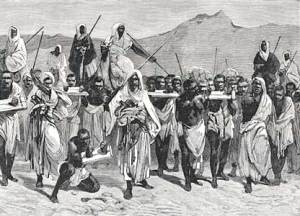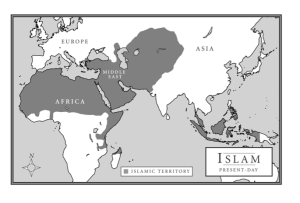Islam aggravated slavery
Islam did not institute slavery, but embraced the age-old practice with open arms and gave it a divine validation to last for the eternity and promoted it to a hitherto unprecedented scale. It is groundless to claim that Islam closed the door to slavery or took the first step toward its abolition. In the Quran, Allah repeatedly gave approval of slavery as part of His divine plan, which must stand until the end of the world. Not only that, Islam aggravated the practice of slavery at its very inception, which worsened further over the centuries. Prophet Muhammad enslaved the children and women of Banu Qurayza, Khaybar and Banu Mustaliq [Bukhari 3:46:717], after slaughtering the men. This ideal protocol of the Prophet became the
modus operandi for Muslim warriors through the ages until the West abolished its own engagement in slavery and enforced its ban in the Muslim world—much to the anger, disappointment and even violent opposition of Muslims.
One must take note of the way the Banu Qurayza, Banu Mustaliq and Khaybar Jews were slaughtered and enslaved by the Prophet. Nothing as barbaric and cruel, and on such large-scales, as these took place in the Arabian Peninsula during Muhammad’s life. Islamic history tells us that Muhammad’s father had only one Abyssinian slave-girl, named Barakat. The leading men of Mecca are not recorded to have possessed slaves in their dozens. The Prophet’s first wife Khadijah, despite owning a big business, possessed only one slave, Zayd, whom she presented to Muhammad after their marriage. Muhammad, a Pagan at the time, freed Zayd and adopted him as his son.
During the next fifteen years of his life as a Pagan, Muhammad owned no slave. Over the next twenty-three years of his life as a Muslim and the Prophet of Islam, he accumulated fifty-nine slaves and thirty-eight servants as listed by Ghayasuddin Muhammad Khondmir in
Rauzat-us-Safa. Zubair, Muhammad’s close companion, had a massive 1,000 slaves at the time of his death.896
As a Pagan, Muhammad, and also possibly Zubair, owned no slaves. But after embracing the Islamic faith, they amassed slaves in dozens to a thousand. These examples make it clear that, instead of taking any step toward its abolition, the Prophet of Islam and his closest companions themselves had elevated the institution of slavery to a much higher scale, compared to what pre-existed in Arabia. Islam also introduced a most barbaric and cruel means, albeit with divine sanctions, for capturing slaves on a scale not seen in the then Arabia.
 Slavery, theologically & historically, an integral part of Islam
Slavery, theologically & historically, an integral part of Islam
Despite widespread denials about the existence of slavery in Islam and the claim that Islam took the first step toward its abolition, slavery is indisputably a divinely sanctioned institution in Islam, which will stand valid until the end of the human race. In Islamic doctrine, slavery is integral in Allah’s eternal plan; it’s a part of His divine grace to humankind. All Schools of Islamic jurisprudence, the Sharia, and the religious doctors of Islam throughout history have unequivocally and proudly accepted and preached slavery as an integral part of Islam. The great Islamic thinker Ibn Khaldun recognized mass enslavement of non-Muslims in gloating religious pride when Muslims had transformed Africa into a slave-hunting and -breeding ground. In practicing slavery, writes Lewis, ‘‘
(Muslims) were upholding an institution sanctioned by scripture, law (Sharia), and tradition (Sunnah) and one which in their eyes was necessary to the maintenance of the social structure of Muslim life.’’897 Hughes correctly asserts that in Islam,
‘slavery is interwoven with the Law of marriage, the Law of sale, and the Law of inheritance… And its abolition would strike at the very foundation of the code of Mohammedanism.’898
Ibn Khaldun thought the extensive enslavement of Blacks in Africa by Muslims was justified, ‘
because they have attributes that are quite similar to dumb animals.’899 In the annals of Muslim historians, enslavement in general, especially of the allegedly barbarian Blacks, became a matter of pride. It was also deemed as an act of generosity toward curing them of their barbaric nature and sinful religions by bringing them into the true faith and civilized world of Islam. About this line of thinking of the devout Islamic thinkers, writes Arnold, ‘
devout minds have even recognized in enslavement God’s guidance to the true faith…’900
The Negroes from the Upper Nile countries were violently enslaved in massive numbers and converted to Islam. They were summarily castrated and transported across great distances; in the course of this, the majority of them (80–90 percent) perished. Of those, transported across the Atlantic to the new world, some 30–50 percent perished ‘
in transit to the coast, in confinement awaiting shipment and at sea on the way to Americas.’ The mortality of slaves on board ships in their passage to the New World is estimated at 10 percent.901
This tragic doom of captives of mammoth proportion was also seen as a generosity and ‘
God’s grace’ in Islamic mindset of which, writes Arnold, ‘
God has visited them in their mishap; they can say ‘it was His grace’, since they are thereby entered into the saving religion.’902 Even many religious-minded Western historians, echoed this tune of Muslim thinkers about the massive enterprise of enslavement of Blacks in Africa. Bernard Lewis summarizes the general sentiment in this regard as thus: ‘
…slavery is a divine boon to mankind, by means of which pagan and barbarous people are brought to Islam and civilization… Slavery in the East has an elevating influence over thousands of human beings, and but for it hundreds of thousands of souls must pass their existence in this world as wild savages, little better than animals; it, at least, makes men of them, useful men too…’903
This divine justification, indeed inspiration, for the enslavement of Blacks was so strong amongst Muslims in Africa that they had ‘
given up wholly to the pursuit of commerce or to slave hunting’; and as a result, they were hated and feared by the people as slave-dealers, notes Arnold.904 Sultan Moulay Ismail (d. 1727), as noted already, had slave-breeding nurseries in Morocco. In the Sudan region of Africa, there were firms that specialized in the breeding of Black slaves for sale like cattle and sheep even in the nineteenth century.
Hudud al-Alam—a Persian geographical manuscript written in 982 for the Ghaurivid ruler Abu al- Harith Muhammad ibn Ahmad, records of the Sudan that, ‘
no region is more populated than this. The merchants steal the children there and take them away. They castrate them and take them to Egypt, where they sell them.’ Slavery reached such a level that ‘
Among them there are people who steal each others children to sell them to the merchants when they come,’ adds the document.905
Muslims had integrated the institution of slavery into the African society so thoroughly that when the Europeans, particularly their missionaries, tried to liberate them, the slaves felt it preferable to remain under their masters than embrace the challenging free life of taking their destiny into their own hands. A report on the first three years of British administration in Central Africa noted that slave-trade stood as ‘‘
a rival kind of civilization to that of white man which it is of a much easier notion for the Negro mind to accept.’’906 Enslavement became so widespread in Africa that as ‘
Africa became almost synonymous with slavery, the world forgot the eagerness with which the Tartars and other Black Sea peoples had sold millions of Ukrainians, Georgians, Circassians, Armenians, Bulgarians, Slavs, and Turks,’ laments BD Davis.907 The most precious commodity that Muslim traders brought from the trading centre of Volga in the tenth century was white slaves, normally sold by the Vikings.
SPECIAL CRUELTY AND CASUALTY OF ISLAMIC SLAVERY
Possibly the most devastating aspect of Islamic slavery was the castration of male captives. The majority of the enslaved African males were emasculated before selling them in the Muslim world. In India, we have noted of large-scale castration of male captives from the beginning to the end of the Islamic rule. Even top generals, namely Malik Kafur and Khusrau Khan, were castrated, which suggest that the castration of male captives was widespread in India, too. There was also widespread castration of European slaves.
The worst casualty of castration was obviously the robbing of man’s most fundamental identity and treasure—his manhood, which he is born with. The greatest tragedy of castration was, however, the massive mortality in the operation. According to Koenraad Elst, ‘
Islamic civilization did indeed practice castration of slaves on an unprecedented scale. Several cities in Africa were real factories of eunuchs; they were an expensive commodity as only 25 percent of the victims survived the operation.’908 Furthermore, a large number of captives perished during their passages to markets of the Muslim world, often thousands of miles away; this constituted another huge tragedy of Islamic slavery. The casualties in the raids for harvesting slaves could also be enormous. In Central Africa, recorded Commander VL Cameron, Islamic slave-raiders left the trails of
burnt villages, of slaughter and the devastation of crops. The loss of life caused by these raids must have been enormous, though it is of course impossible to give any exact figures. Burton, a British explorer, estimated that in order to capture fifty-five women, the merchandise of one of the caravan he observed, at least ten villages had been destroyed, each having a population between one and two hundred souls. The greater part of these were exterminated or died of starvation.
909
On the magnitude of the mortality of slaves, writes Segal,
‘The arithmetic of the Islamic black slave trade must also not ignore the lives of those men, women and children taken or lost during the procurement, storage and transport. One late nineteenth century writer held that the sale of a single captive for slavery might represent a loss of ten in the population—from defenders killed in attacks on villages, the deaths of women and children from related famine and the loss of children, the old and the sick, unable to keep up with their captors or killed along the way in hostile encounters, or dying of sheer misery.’910
Segal collates a number of incidents of slaves being perished in their transportation.911
Explorer Heinrich Barth recorded that a slave caravan of his friend Bashir,
wazir of Bornu, on the way to Mecca during pilgrimage season lost forty slaves in the course of a single night, killed by severe cold in the mountain. One British explorer came across over 100 human skeletons from a slave caravan
en route to Tripoli. The British explorer Richard Lander came across a group of thirty slaves in West Africa, all of them stricken with smallpox, all bound neck to neck with twisted strips of bullock hide. One caravan from the East African coast with 3,000 slaves lost two-thirds of its number from starvation, disease and murder. In the Nubian Desert, one slave caravan of 2,000 slaves literally vanished as every slave had died.
Various estimates put the number of black Africans reduced to slavery in the Islamic world from eleven to thirty-two million. Since 80–90 percent of the captives had perished before reaching their destination, it is not difficult to imagine the quantum of human lives lost as a result of the cruel and barbaric institution of Islamic slavery. Ronald Segal, despite being sympathetic to Islam, puts the number of enslaved black Africans at eleven million and admits that well over thirty million of people might have died at the hands of Muslim slave hunters and traders or ended up as slaves in the Muslim world. From the data presented so far, the institution of Islamic slavery, undoubtedly, has been one of the greatest tragedies to befall humankind.
For the complete references to the above excerpt, please refer to M. A. Khan’s book:
Islamic Jihad: A Legacy of Imperialism, Forced Conversion and Slavery. A free copy is available online.
https://secularafrican.wordpress.com/2013/08/22/denials-of-islamic-slavery/



